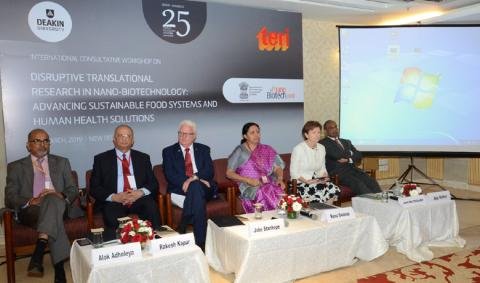DBT & TERI set up Nanobiotech@DBT
March 15, 2019 | Friday | News
The platform will focus on promoting translational research to convert nanobiotechnology research to practical applications
The Department of Biotechnology (DBT) and the TERI-Deakin Nanobiotechnology Centre (TDNBC) have set up Nanobiotech@DBT. This platform will bring together the nanobiotechnology community and translate lab-based research into practical applications that benefit society.
On the occasion, Dr Ajay Mathur, Director General, TERI, said, “The idea is to convert research into scalable ideas that lead to the kinds of applications that farmers, doctors and others in allied areas need.”
Dr Alok Adholeya, Senior Director, Sustainable Agriculture division, TERI, added, “This platform is one of the key steps in bringing the nanobiotechnology community together to collaborate and share resources, information, knowledge, facilities, ideas, and infrastructure to create impactful and strategy driven research.”
TDNBC, which is implementing the Nanobiotech@DBT platform, will provide support from ideation to conceptualisation, implementation, incubation, and commercialisation. The platform will utilise both physical and virtual platforms for researchers and stakeholders to connect. It will be the first of its kind platform to bring all nanobiotechnology related research to a common platform and provide regular online updates on the DBT’s nanobiotechnology supported projects, nano-biocommunity, facilities and infrastructure, and related information and links.
It will focus on five key areas of (i) Diagnostics & Imaging (ii) Nanomedicine & Therapeutics (iii) Delivery Vehicle (iv) Nanoenabled Systems & Devices; and (v) Agriculture, environment, nanotoxicology.
Dr Renu Swarup, Secretary, DBT, spoke about the platform at the International workshop on ‘Disruptive Translational Research in Nano-biotechnology: Advancing Sustainable Food Systems and Human Health Solutions’ in India Habitat Centre in New Delhi on Wednesday. The workshop was organised by Deakin University, Australia, in association with TERI and DBT.
“Translational research requires human resource, expenditure, deep domain research experience, and a whole ecosystem. Currently, there is a gap in translational research that we need to plug. Research is not getting translated into products. TDNBC, with its vast experience, is in a great place to do this,” Dr Swarup added.
Stressing on the importance of regulation in product development, she added, “The DBT has made efforts and prepared guidelines for the pharmaceutical sector. TERI and other partners could do the same for agriculture sector. This will benefit not just regulators, but also innovators and the industry at large.”
Speaking on the Indo-Australian collaboration of TERI and Deakin University, she said, “We have to take partnership in this field beyond India and Australia. Going forward, it should be opened up to neighbouring countries. There are large opportunities for the Centre to provide leadership for research, capacity building, and innovation in translational research in the region.”
Rakesh Kapur, Joint Managing Director, Indian Farmers Fertilisers Cooperative Ltd, and a member of the governing board of TDNBC, delivered the guest of honour address at the event. He stressed that research has to be of use to the industry.
“As compared to conventional fertilisers, 20 per cent less nanofertilisers are required to be applied. With nanobiotechnology, there will be rapid disruptive change in the usage of fertilisers,” he said.
At the workshop, Dr Adholeya also announced a collaboration with Aurea Systems, Germany, to launch TERI’s mycorrhiza products in India. Aurea has been marketing the product in North America and Europe and is set to enter the Indian market with this collaboration. Mycorrhiza is a biofertiliser that has the potential to reduce the use of chemical fertilisers globally by nearly 50 per cent.
John Stanhope AM, Chancellor, Deakin University said, “Nanobiotechnology has opportunities in agriculture, health, food, and environment. When industries and research come together, they make a powerful team.”
A collaboration between TERI and Osho Resources India for bioreclamation of fly ash dumps, coal and coal waste dumps, and Acid Mine Drainage (AMD) was also announced.










